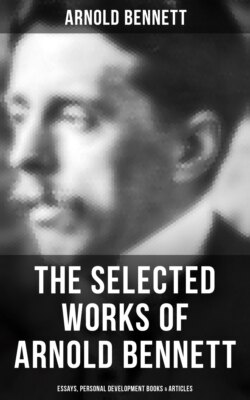Читать книгу The Selected Works of Arnold Bennett: Essays, Personal Development Books & Articles - Arnold Bennett - Страница 25
На сайте Литреса книга снята с продажи.
IX
ОглавлениеTable of Contents
My novel, under a new title, was published both in England and America. I actually collected forty-one reviews of it, and there must have been many that escaped me. Of these forty-one, four were unfavourable, eleven mingled praise and blame in about equal proportions, and twenty-six were unmistakably favourable, a few of them being enthusiastic.
Yet I had practically no friends on the Press. One friend I had, a man of power, and he reviewed my book with an appreciation far too kind; but his article came as a complete surprise to me. Another friend I had, sub-editor of a society weekly, and he asked me for a copy of my book so that he might “look after it” in the paper. Here is part of the result:
“He has all the young novelist’s faults. . . These are glaring faults; for, given lack of interest, and unpleasant scenes, how can a book be expected to be popular?”
A third friend I had, who knew the chief fiction-reviewer on a great morning paper. He asked me for a special copy of my book, and quite on his own initiative, undertook to arrange the affair. Here is part of the result:
“There is not much to be said either for or against —— by Mr. ——.”
I had no other friends on the Press, or friends who had friends on the Press.
I might easily butcher the reviews for your amusement, but this practice is becoming trite. I will quote a single sentence which pleased me as much as any:—“What our hero’s fate was let those who care to know find out, but let us assure them that in its discovery they will read of London life and labour as it is, not as the bulk of romances paint it.” All the principal organs were surprisingly appreciative. And the majority of the reviewers agreed that my knowledge of human nature was exceptionally good, that my style was exceptionally good, that I had in me the makings of a novelist, and that my present subject was weak. My subject was not weak; but let that pass. When I reflect how my book flouted the accepted canons of English fiction, and how many aspects of it must have annoyed nine reviewers out of ten, I am compelled to the conclusion that reviewers are a very good-natured class of persons. I shall return to this interesting point later—after I have described how I became a reviewer myself. The fact to be asserted is that I, quite obscure and defenceless, was treated very well. I could afford to smile from a high latitude at the remark of The New York —— that “the story and characters are commonplace in the extreme.” I felt that I had not lived in vain, and that kindred spirits were abroad in the land.
My profits from this book with the exceptional style and the exceptional knowledge of human nature, exceeded the cost of having it typewritten by the sum of one sovereign. Nor was I, nor am I, disposed to grumble at this. Many a first book has cost its author a hundred pounds. I got a new hat out of mine.
What I did grumble at was the dishonour of the prophet in his own county. Here I must delicately recall that my novel was naturalistic, and that it described the career of a young man alone in London. It had no “realism” in the vulgar sense, as several critics admitted, but still it was desperately exact in places, and I never surrounded the head of a spade with the aureole of a sentimental implement. The organ of a great seaport remarked: “We do not consider the book a healthy one. We say no more.” Now you must imagine this excessively modern novel put before a set of estimable people whose ideas on fiction had been formed under the influence of Dickens and Mrs. Henry Wood, and who had never changed those ideas. Some of them, perhaps, had not read a novel for ten years before they read mine. The result was appalling, frightful, tragical. For months I hesitated to visit the town which had the foresight to bear me, and which is going to be famous on that score. I was castigated in the local paper. My nearest and dearest played nervously with their bread when my novel was mentioned at dinner. A relative in a distant continent troubled himself to inform me that the book was fragmentary and absolutely worthless. The broader-minded merely wished that I had never written the book. The discreet received it in silence. One innocent person, for whom I have the warmest regard, thought that my novel might be a suitable birthday present for his adolescent son. By chance he perused the book himself on the birthday eve. I was told that neither on that night nor on the next did he get a wink of sleep. His adolescent son certainly never got my book.
Most authors, I have learnt on inquiry, have to suffer from this strange lack of appreciation in the very circle where appreciation should be kindest; if one fault isn’t found, another is; but they draw a veil across that dark aspect of the bright auctorial career. I, however, am trying to do without veils, and hence I refer to the matter.
